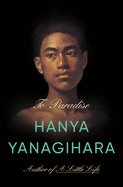
In her sprawling third novel, Hanya Yanagihara (A Little Life; The People in the Trees) begs to differ with John Donne's 17th-century aphorism that no man is an island. To Paradise is indeed thoroughly preoccupied with islands: Manhattan and Hawaii, as well as an archipelago of characters sharing names across three consecutive centuries in an alternate history, always at tragic crossways with one another.
The 19th-century David Bingham is the eldest heir of a wealthy Manhattan family, whose legacy is pitched between a conventional marriage to Charles Griffith and an exciting affair with Edward Bishop. The 20th-century David Bingham also lives in New York, with Charles Griffith, an affluent lawyer, despite being the heir-in-exile to the Kingdom of Hawaii, which Edward Bishop desperately and resentfully tries to preserve against the onslaught of colonialism. And in a 21st century smothered by plague, Charles, a research scientist, rhapsodizes about Davids Island, N.Y.: it could be a refugee camp for the mystifying variations of his prodigal son, "at all different ages.... There would be no misunderstandings... no loneliness.... They would only know one another, which is to say themselves, and their happiness would be complete."
This triptych surveys a dazzling alternate multiverse, but consistently returns to the dilemma of balancing risk and security in one's flight from despondency toward an ever-elusive utopia. Composed with an increasing number of epistles soaked in personal regrets, To Paradise is an ambitious undertaking, but ultimately rewarding. At times Yanagihara's aesthetic commitment to maximalism distracts from her iconoclastic brilliance, but the overall effect is a thorough and humane examination of "those who wept for the world, and those who wept for themselves." --Dave Wheeler, associate editor, Shelf Awareness

